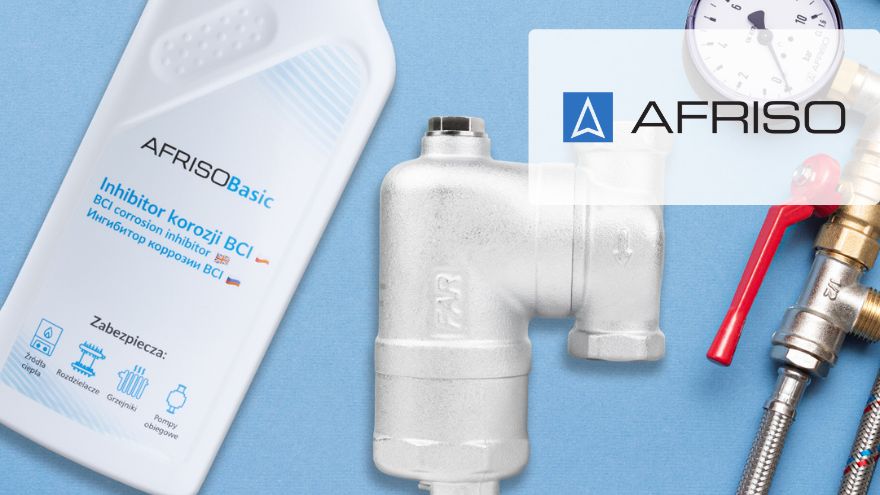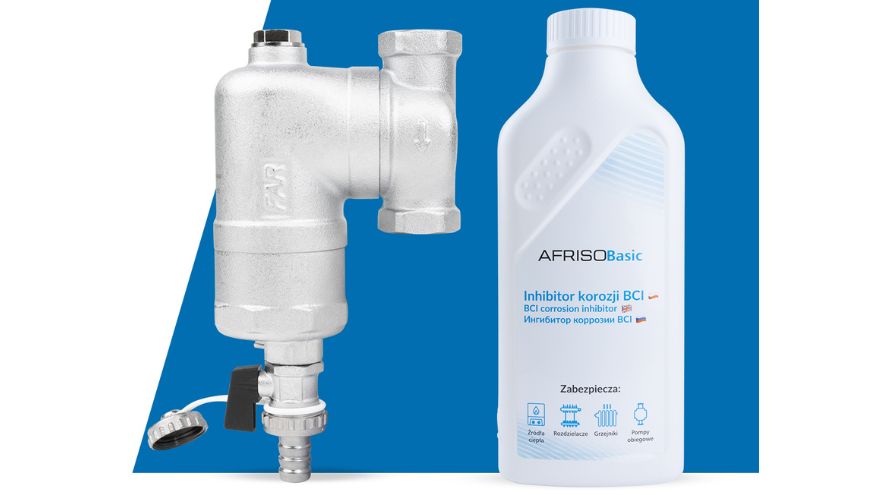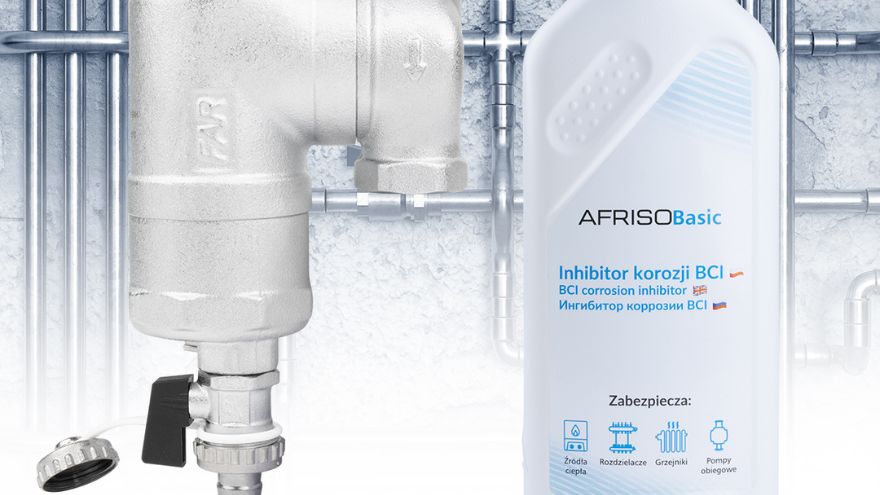Pollution and corrosion are the most serious threats to the efficiency and service life of installations. Every installer has dealt with them, and it's possible that everyone has their own way of dealing with them. Here are our proven tips!

From this article you will learn:
- what are the greatest threats to the efficiency and performance of the heating installation,
- what are the ways to fight them,
- why prevention is better than cure.
Corrosion - how it affects the installation and how to fight it
Corrosion appears in virtually every heating installation , regardless of the heat source and whether it is distributed through radiators or 100% underfloor heating. You will see it easily when you release some water from the installation. It may show itself after just a few months of work. You will also see corrosion on transparent elements of the installation, such as separator settling tanks and rotameter glasses in the distributor.
Corrosion has many negative consequences for the installation: limited flow, blocking of thermostatic valves and circulation pumps, and an overall significant decrease in efficiency . Unfortunately, the condition of the boiler room will only deteriorate over time.
What does the rate of corrosion depend on?
Some installations look better after years, which is mainly due to the amount of oxygen dissolved in the heating medium. Open type installations are permanently connected to air through an overflow vessel and are therefore more susceptible to corrosion . Closed type installations provide some protection against corrosion because they do not have as much contact with air.
 Corrosion may also be caused by the pH of the water you fill the installation with. Depending on the type of metal the system is made of, the appropriate pH level must be selected . Test it first, then once the heating medium has stabilized, do it again. You can adjust the pH by adding appropriate chemicals.
Corrosion may also be caused by the pH of the water you fill the installation with. Depending on the type of metal the system is made of, the appropriate pH level must be selected . Test it first, then once the heating medium has stabilized, do it again. You can adjust the pH by adding appropriate chemicals.
When installing a central heating system, pay attention to what metal alloys you connect together, as contact corrosion may occur, i.e. the transfer of current between two elements caused by a potential difference. This is where insulating spacers help.
How to slow down the development of corrosion?
The solution to maximum corrosion reduction is the BCI corrosion inhibitor from AFRISO . It creates a passive layer on the metal surface, which protects installations made of copper, steel and brass against corrosion . The inhibitor can be used in installations with all types of seals, you can also add it to installations containing glycol.
The most frequently chosen heat sources are gas boilers and heat pumps. Their combination with underfloor heating (which has low supply temperatures) increases the risk of bacterial flora developing in the installation . A BCI inhibitor contains a substance that prevents this. None of the ingredients of the inhibitor have a negative impact on the natural environment, and its composition has been thoroughly tested in a certified laboratory.
The recommended concentration of BCI inhibitor in the installation is a minimum of 0.5%, so a 0.5-liter package will protect an installation with a capacity of 100 liters against corrosion . For a slightly smaller installation (e.g. 80 liters), you can also pour the entire package without any worries - it's better to pour too much than too little.
How to apply BCI corrosion inhibitor? There are several ways. It can be fed through a dirt separator (e.g. the compact magnetic dirt separator Afriso ADS 110 ), through a hydraulic coupling or using a radiator - preferably a bathroom one, because it is the highest point of the installation. We can pour the BCI inhibitor directly into new installations. Modernized installations should be thoroughly rinsed first. The cost of a BCI corrosion inhibitor is low when compared to the price of the entire installation, but it can save a lot of time and nerves by minimizing the risk of failure.
Check out the offer of Afriso products for heating installations
Pollution - where it comes from and how to reduce its amount
We often do not realize the condition of the heating medium and what is happening inside the installation. The appearance of contaminants means there is a risk of damage to expensive system parts and a reduction in its efficiency.
The installation may include:
- scale – calcium or magnesium deposits precipitated by high temperatures. These are natural components of tap water, so to completely remove them, the water would need to be demineralized. Scale is a very good insulator, so unfortunately its accumulation will significantly limit the ability to transfer heat from the exchangers to the heating medium;
- rust particles – everything that comes from metal elements of the installation;
- suspended particles from the water supply network - sand or metal particles;
- remnants of installation works , i.e. remnants of Teflon tape, tow and everything that remains after soldering the pipes.
What harm can pollution do?
 The most at-risk element of the installation are thermostatic valves - they have a thermostatic element that dispenses the appropriate amount of warm and cooler medium to obtain the set temperature behind the valve. When dirt gets into the valve, this element will become blocked and proper temperature regulation will be impossible.
The most at-risk element of the installation are thermostatic valves - they have a thermostatic element that dispenses the appropriate amount of warm and cooler medium to obtain the set temperature behind the valve. When dirt gets into the valve, this element will become blocked and proper temperature regulation will be impossible.
Rotary mixing valves with an actuator are at a similar risk. Contaminants may block the valve cover, which may result in the actuator burning out. However, in radiators, impurities settle in the lower part, which prevents full heat release , i.e. the radiator will only heat partially.
Remember that circulation pumps create a magnetic field that attracts metallic particles suspended in the medium. This, in turn, may result in damage to the pump impeller. Pollutants may also settle in pipes, limiting their diameter and flow , and as a result, rooms will be underheated.
Filter and separator - a double hit against contaminants
You can use a FAR dirt separator to protect yourself. Due to the structure and use of the internal filter element, it slows down the flow, which causes contaminants to settle in its lower part. In addition, FAR separators have strong magnets that attract metal particles (chips, metal and rust particles). The separator can retain smaller contaminants than a mesh filter.
Compared to a mesh filter, the maintenance of the separator is simple . There is no need for tools or cutting off the flow (it is worth doing this periodically, just like rinsing the internal elements of the separator). Just unscrew the drain valve cap - the collected dirt and water under pressure will be removed.
This does not mean that a mesh filter is not suitable. On the contrary: to have a well-protected installation, install a mesh filter (on the return from the installation) and a dirt separator .
Check out the offer of Afriso products for heating installations